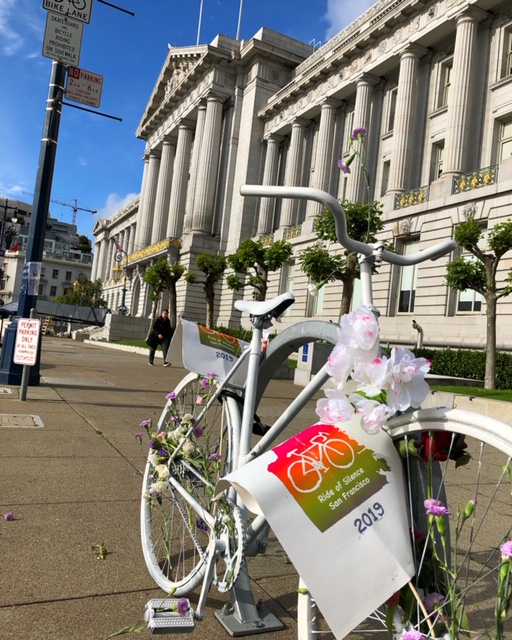Just this week, a man was killed by a dump truck in a crosswalk at Stanyan and Parnassus, marking the 20th pedestrian who has died on our streets just this year. As we enter the second decade of Vision Zero in San Francisco, it’s more critical than ever that we elect a mayor who will show up for street safety projects, and not back down in the face of controversy or opposition.
So who should advocates support, when every candidate is willing to say they support bike lanes and pedestrian safety? On a quest to determine which candidate is the best for safe streets, we at KidSafe SF looked at the positions candidates have taken on several marquee issues and victories for the safe streets community.
We were particularly interested in whether candidates would protect the progress advocates have made on car-free Market Street; whether they support Prop K, which would create Ocean Beach Park and keep parts of the Great Highway permanently closed to cars; how they stack up on Slow Streets and protected bike lanes; and whether they had supported car-free JFK.
Let’s start with our current mayor, London Breed. Breed backed a car-free JFK Promenade two years ago, built dozens of miles of bike lanes and permanent slow streets, hasn’t backed down from car-free Market Street, and is the only candidate supporting Prop K. She recently appointed transit advocate Mike Chen to the SFMTA Board, alongside other board members who have upheld the city’s transit-first policy and supported new safe streets infrastructure. Breed has also finally closed the crucial gap in the Polk Street protected bike lane right in front of City Hall, a project scheduled to open this week.
Yet progress on streets can be frustratingly slow, so it’s worth considering whether other candidates could deliver faster. From the beginning, candidate Mark Farrell has actively campaigned to bring cars back to Market Street, which would undo one of San Francisco’s biggest street safety wins in years. He’s also said he believes that the city can “balance” safety infrastructure “while not making it impossible to drive and park in San Francisco”–hardly words that inspire confidence in his ability to make the tough tradeoffs necessary to design safe streets.
Fellow candidate Aaron Peskin’s record is equally lamentable—he’s been silent on the city’s long-delayed Biking and Rolling Plan and has publicly come out against Prop K. His recent e-bike rebate program comes across as nothing more than a publicity stunt, especially in light of his vote against making JFK car-free back in 2022.
Then there’s Daniel Lurie. Lurie’s campaign paints him as a pro-safe streets hero, calling for concrete-protected bike lanes and advertising that he rides an e-bike. Yet there’s a gap between his campaign rhetoric and his actual positions.
First, like Farrell and Peskin, Lurie has come out against Prop K, standing with the status quo. He even went so far as to call Prop K a “power grab” by City Hall. Indeed, his campaign is backed by Google Ads touting his position to anyone searching for information about the Great Highway. Pedestrian-only areas are not only vital to street safety, but add vibrant spaces to our urban landscape—yet that’s not the San Francisco Lurie wants to build.
He has also stayed silent on whether he supported 2022’s Proposition J to make JFK Promenade permanent. Prop J won with 63 percent of the vote–why is it so hard to take a position on something that was so popular with voters?
Second, Lurie, like Farrell, supports bringing rideshare vehicles back to Market Street. Removing cars from Market Street has reduced pedestrian injuries and helped speed up commutes for the hundreds of thousands of people who use Muni to get downtown, so this one is a head-scratching move for someone whose campaign portrays him as an e-bike riding champion of sustainable transportation.
Finally, Lurie, like Farrell, has said he would rely on police officers as a primary way to address street safety. With an understaffed police force focused on other priorities, enforcement will never be a scalable solution for street safety. Instead, the real solution lies in self-enforcing street design–creating pedestrian-only corridors, protected bike lanes, and traffic-calming measures that naturally reduce speeding and reckless driving. Infrastructure changes are scalable, permanent and equitable, making streets safer without the need for constant enforcement. Lurie’s focus here reveals inexperience–and a fundamental lack of understanding of what actually works to prevent dangerous behavior.
Street safety is non-negotiable. It’s also popular, and politicians should pay attention. Voters supported a car-free JFK Promenade with 63 percent of the vote. City-wide polls indicate that nearly half of residents have either been injured by a car while walking or biking, or know someone who has. We need leaders who don’t just say the right things, but who will back up those words with actions.
After examining the positions of all the viable candidates, we believe the candidates have been clear on where they stand on safe streets priorities. If this issue is a priority for you, vote accordingly.
***
Robin Pam is a co-founder of KidSafe SF, A 501(c)4 advocacy organization, and was the campaign manager for 2022’s Prop J, which made JFK Promenade permanently car-free. You can see KidSafe SF's endorsements here.





